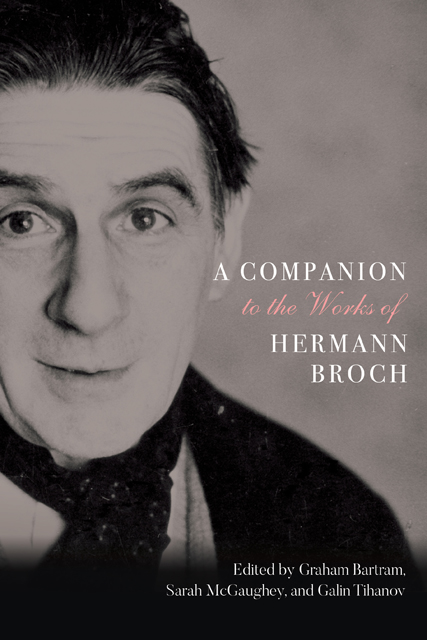Book contents
- Frontmatter
- Contents
- Preface
- Acknowledgments
- List of Abbreviations
- Introduction: Broch’s Life and Works
- 1 Perspectives on Broch’s Die Schlafwandler: Narratives of History and the Self
- 2 Hermann Broch and the Dilemma of Literature in the Modern Age
- 3 Interrogating Modernity: Hermann Broch’s Postromanticism
- 4 Broch and the Theater: Die Entsühnung and Aus der Luft gegriffen as Tragic and Comic Dramatizations of the Economic Machine
- 5 Limits of the Scientific: Broch’s Die Unbekannte Größe
- 6 Broch’s Die Verzauberung: Ludwig Klages and the Bourgeois Mitläufer
- 7 Hermann Broch’s Massenwahnprojekt and Its Relevance for Our Times
- 8 Human Rights and the Intellectual’s Ethical Duty: Broch’s Political Writings
- 9 Broch’s Der Tod des Vergil: Art and Power, Language and the Ineffable
- 10 From the “Tierkreis-Erzählungen” to Die Schuldlosen: The Creation of Broch’s Last Novel
- 11 Broch’s Legacy and Resonance
- Selected Bibliography
- Notes on the Contributors
- Index
9 - Broch’s Der Tod des Vergil: Art and Power, Language and the Ineffable
Published online by Cambridge University Press: 20 January 2023
- Frontmatter
- Contents
- Preface
- Acknowledgments
- List of Abbreviations
- Introduction: Broch’s Life and Works
- 1 Perspectives on Broch’s Die Schlafwandler: Narratives of History and the Self
- 2 Hermann Broch and the Dilemma of Literature in the Modern Age
- 3 Interrogating Modernity: Hermann Broch’s Postromanticism
- 4 Broch and the Theater: Die Entsühnung and Aus der Luft gegriffen as Tragic and Comic Dramatizations of the Economic Machine
- 5 Limits of the Scientific: Broch’s Die Unbekannte Größe
- 6 Broch’s Die Verzauberung: Ludwig Klages and the Bourgeois Mitläufer
- 7 Hermann Broch’s Massenwahnprojekt and Its Relevance for Our Times
- 8 Human Rights and the Intellectual’s Ethical Duty: Broch’s Political Writings
- 9 Broch’s Der Tod des Vergil: Art and Power, Language and the Ineffable
- 10 From the “Tierkreis-Erzählungen” to Die Schuldlosen: The Creation of Broch’s Last Novel
- 11 Broch’s Legacy and Resonance
- Selected Bibliography
- Notes on the Contributors
- Index
Summary
Stahlblau und leicht, bewegt von einem leisen, kaum merklichen Gegenwind, waren die Wellen des adriatischen Meeres dem kaiserlichen Geschwader entgegengeströmt, als dieses, die mählich anrückenden Flachhügel der kalabrischen Küste zur Linken, dem Hafen Brundisium zusteuerte, und jetzt, da die sonnige, dennoch so todesahnende Einsamkeit der See sich ins friedvoll Freudige menschlicher Tätigkeit wandelte, da die Fluten, sanft überglänzt von der Nähe menschlichen Seins und Hausens, sich mit vielerlei Schiffen bevölkerten, mit solchen, die gleicherweise dem Hafen zustrebten, mit solchen, die aus ihm ausgelaufen waren, jetzt, da die braunsegeligen Fischerboote bereits überall die kleinen Schutzmolen all der vielen Dörfer und Ansiedlungen längs der weißbespülten Ufer verließen, um zum abendlichen Fang auszuziehen, da war das Wasser beinahe spiegelglatt geworden; perlmuttern war darüber die Muschel des Himmels geöffnet, es wurde Abend, und man roch das Holzfeuer der Herdstätten, so oft die Töne des Lebens, ein Hämmern oder ein Ruf von dort hergeweht und herangetragen wurden. (KW 4, 11)
—Hermann Broch, Der Tod des Vergil[Steel-blue and light, ruffled by a soft, scarcely perceptible crosswind, the waves of the Adriatic streamed against the imperial squadron as it steered toward the harbor of Brundisium, the flat hills of the Calabrian coast coming gradually nearer on the left. And here, as the sunny yet deathly loneliness of the sea changed with the peaceful stir of friendly human activity where the channel, softly enhanced by the proximity of human life and human living, was populated by all sorts of craft—by some that were also approaching the harbor, by others heading out to sea and by the ubiquitous brown-sailed fishing boats already setting out for the evening catch from the little breakwaters which protected the many villages and settlements along the white-sprayed coast—here the water had become mirror-smooth; mother-of-pearl spread over the open shell of heaven, evening came on, and the pungence of wood fires was carried from the hearths whenever a sound of life, a hammering or a summons, was blown over from the shore.]
—The Death of Virgil, trans. Jean Starr Untermeyer
ALMOST A DECADE before the fall of the Berlin Wall in 1989, this passage—the opening scene of Hermann Broch’s Der Tod des Vergil— captured the artistic imagination of a then unknown eighteen-year-old East German from Dresden.
- Type
- Chapter
- Information
- A Companion to the Works of Hermann Broch , pp. 189 - 206Publisher: Boydell & BrewerPrint publication year: 2019



